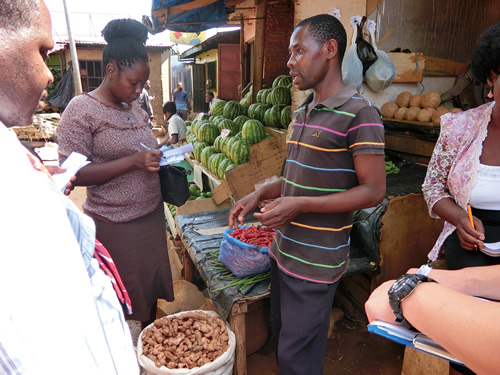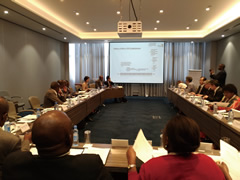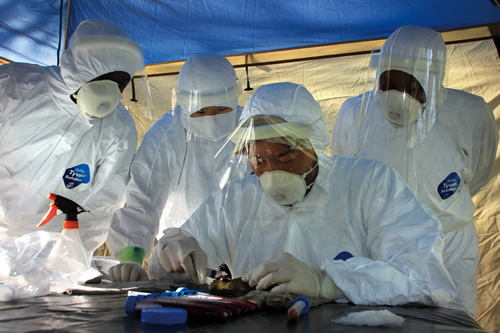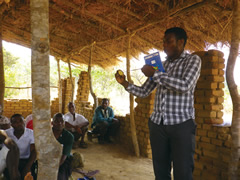The 7th Tokyo International Conference on African Development (TICAD 7) will be held in Yokohama City in Japan next year,2019. TICAD VI, which was held in 2016, adopted three pillars for Japan's cooperation policy with Africa: (1) Promotion of economic structural changes through economic diversification and industrialization, (2) Promotion of a resilient health system for high quality of life, and (3) Promotion of social stabilization for shared prosperity. Here we introduce the initiatives for promoting agriculture and creating measures against infectious diseases that JICA aims to extend all over Africa in line with these three pillars.
SHEP Approach
Aiming at Improving the Livelihood of Farmers with "Agriculture as a Business"

Market survey by a farmer from Malawi. Under the SHEP approach, farmers go to the market themselves and gather various information, such as the crops that are in demand and market prices.
The Smallholder Horticulture Empowerment and Promotion (SHEP) approach was born out of a technical cooperation that JICA implemented in Kenya in 2006, with the aim of improving the income of smallholder farmers. The distinctive characteristic of this approach is that it changed the mindset of the farmers from the conventional "grow and sell" to "grow to sell" through efforts such as market surveys by farmers themselves and trainings for (a) gender equality between wife and husband and (b) management for commercial farming. Through this project, roughly 2,500 farmers' incomes were doubled.
In recent years, many countries in Africa have been working on the promotion of market-oriented agriculture. At TICAD V in 2013, Japan decided on the regional expansion of SHEP over Africa as one of the pillars for Japanese cooperation in Africa.
JICA started by conducting trainings in Japan and Kenya for administrative officials in charge of agricultural extension services for farmers in each African country. Trainees prepared business plans utilizing the concept of SHEP, and then took the lead in implementing those plans after they returned to their own countries.
One of the countries working with SHEP is Malawi, where agricultural workers account for around 80% of the working population. The action plans prepared by trainees from Malawi, including surveys on farmers' needs and crop selection, were implemented in four model provinces. It resulted in their improved livelihood, the launch of joint sales of produce by groups of smallholder farmers, and improved quality of produce. In addition to developing a system for the continuous implementation of SHEP and improving the capacities of officials of the Ministry of Agriculture, JICA has implemented technical cooperation for establishing the original SHEP approach based on the current situation in Malawi, while facing limitations in budget and human resources. Various initiatives are being carried out, including gender and family budget trainings, market surveys, and stakeholder forums between market representatives and farmers.
Moreover, Japanese experts have been dispatched to South Africa to provide technical advice, not only to South African trainees, but also to trainees who have returned to neighboring countries in Southern Africa such as Namibia, Lesotho, and Zimbabwe, and to support agricultural extension activities utilizing SHEP.
JICA will continue to promote the utilization of SHEP and actively engage in PR activities in collaboration with various partners, including companies involved in local agricultural extension and training institutes for extension workers, in order to establish "agriculture as a business."

Preparatory meeting on the PREPARE Program held by JICA in Nairobi, the capital of Kenya, in 2017.
Universal Health Coverage (UHC)
Strengthening the Functions of Research Centers for Measures Against Infectious Diseases

Joint research on viral zoonoses in Africa by UNZA-SVM and Hokkaido University.
The spread of the Ebola virus in West Africa in 2014 caused the international community to recognize anew the importance of strengthening the preparations for and response to public health crises. In the midst of this renewed awareness, Japan decided on a basic policy and plan to strengthen measures against infectious diseases in 2016. At TICAD VI, it was announced that Universal Health Coverage (UHC) aimed at creating a society where all people can receive basic health services would be promoted in Africa and that support would be provided to improve the ability to prepare for and respond to public health crises. In response, and as part of its support, JICA launched the Partnership for Building Resilience against Public Health Emergencies through Advanced Research and Education (PREPARE) .
Currently, under the PREPARE concept, JICA works on (1) strengthening the functions of the country's hub laboratories that also serve as regional hub laboratories for controlling infectious diseases in Africa, (2) medium- to long-term human resource development for measures against infectious diseases through acceptance of students to universities, and (3) contributing to regional and international initiatives such as the newly launched Africa Centres for Disease Control and Prevention (Africa CDC). The plan is to start with five countries: Kenya, Ghana, and Zambia, where Japan has a long track record of cooperation, and the Democratic Republic of the Congo and Nigeria, where increased support for laboratories and other installations are planned, and then expand gradually into other countries in Africa, Asia, and Central and South America.
Since the 1980s, Japan has been engaged in cooperation with one of the regional hub laboratories, the School of Veterinary Medicine (UNZA-SVM) at the University of Zambia. Activities include construction of facilities, provision of equipment, and development of human resources. In 1982, before technical cooperation began, there were only eight veterinarians in Zambia; 10 years later, the number had increased to 80, and today there are more than 350. Currently, UNZA-SVM is engaged in joint research with Hokkaido University in the aim of improving the ability to research and investigate viral zoonoses (infectious diseases that can be transmitted to both humans and animals).

Training conducted by an extension worker for a group of farmers in Mchinji, Malawi.
In the academic year of 2017, three people from the Zambian Ministry of Health and Central Veterinary Research Institute studied at Hokkaido University. In the future, they will carry out their own tests and research and will be responsible for training successors. It is expected that this will improve the quality of measures against infectious diseases in Zambia. The goal is for UNZA-SVM to take the lead in providing training on preparations against infectious diseases to those who are engaged in infectious disease control in Southern Africa, and to strengthen the network of laboratories in the region.




scroll